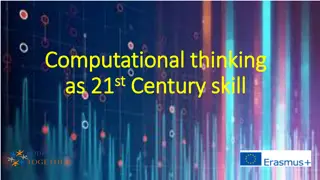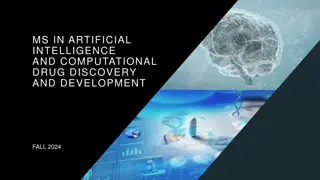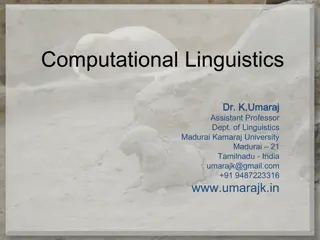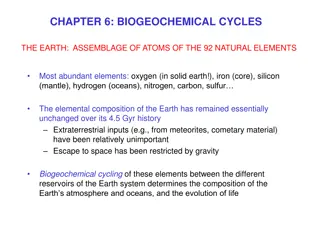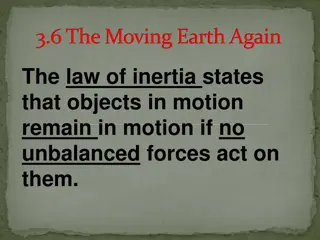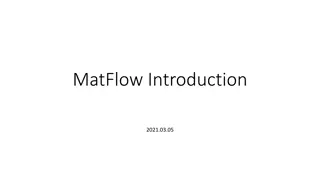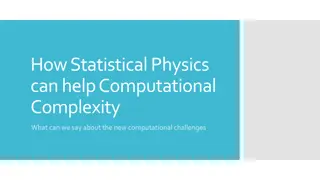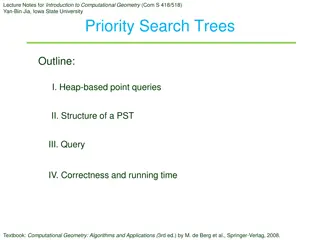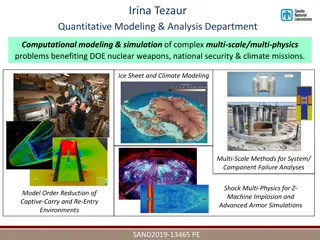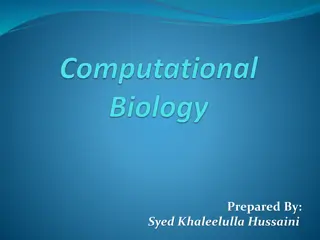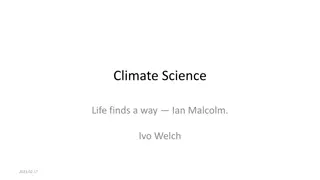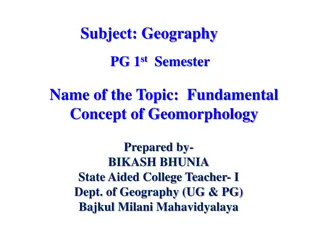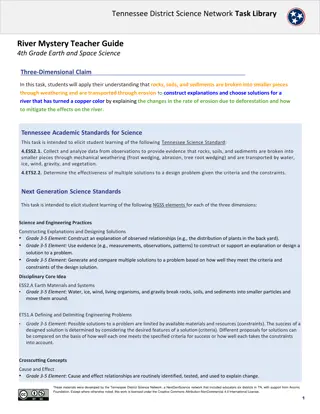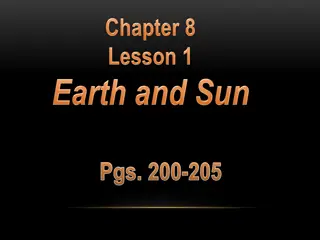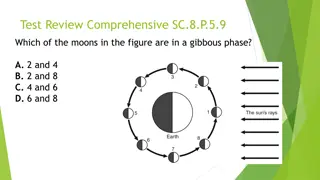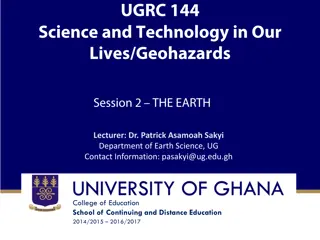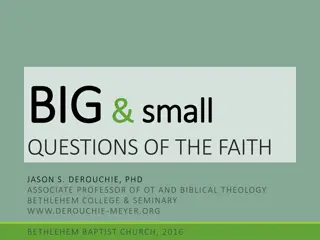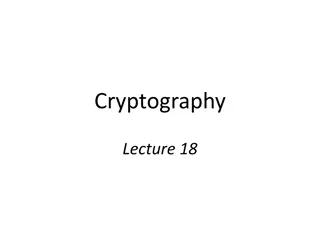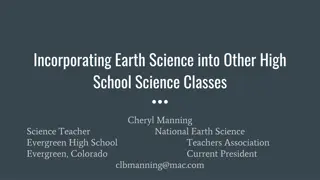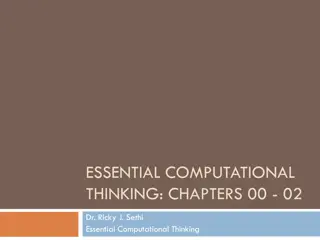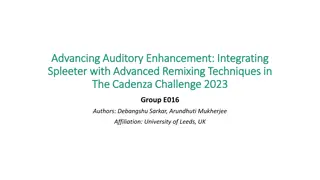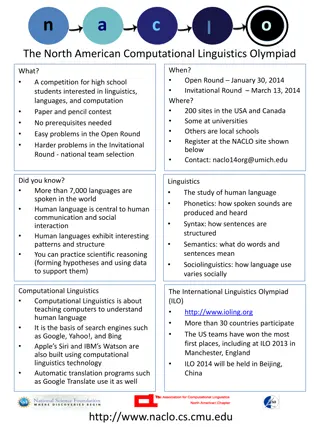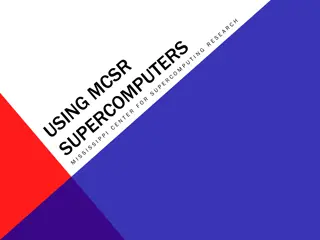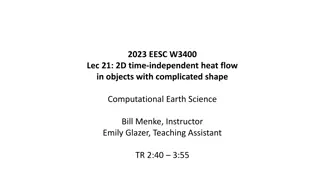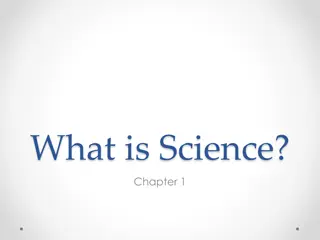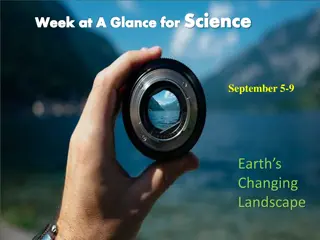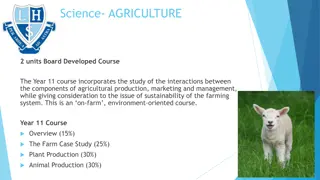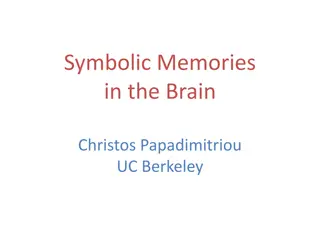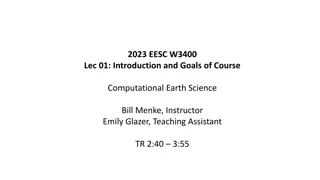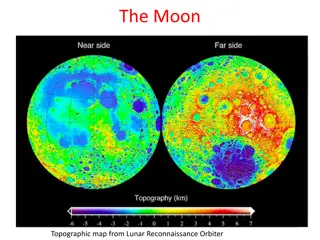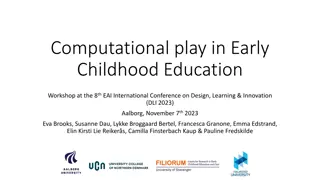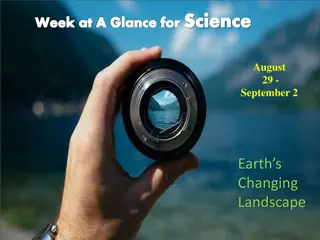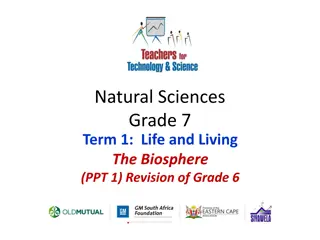M.Tech. (Computational and Data Science)
Get all the information you need about the M.Tech. (Computational and Data Science) course structure, duration, core courses, soft core courses, dissertation, and electives.
1 views • 14 slides
SOLID COPPER EARTH ROD
Nexus Metal & Alloys is a leading manufacturer, exporter and supplier of Solid Copper Earth Rod, Solid Copper Bonded Rod, Solid Copper Earth Rod Lightning Protection Accessories, Pure Copper Bonded Rod, Electrolytic Copper Earth Rod, Solid copper rods, Solid Copper Earth Bars, Solid copper ground el
4 views • 3 slides
Science Week at a Glance: Water in Earth's Processes
This week in science class, students will be focusing on the role of water in Earth's processes, specifically waves, currents, and tides. The curriculum includes analyzing and interpreting data, creating graphic representations, and exploring the causes and effects of these natural phenomena. Studen
3 views • 37 slides
Science Week at a Glance: Water in Earth's Processes
This week in Science class, students will focus on the significant role of water in Earth's processes, specifically exploring where water is located on Earth's surface and understanding the various stages of the water cycle. Each day will involve activities, discussions, and investigations related t
7 views • 13 slides
Science Week at a Glance: Water in Earth's Processes
Explore a week focused on water in Earth's processes, covering topics such as the water cycle and the role of the sun's energy. Activities include investigations, understanding the significance of water in Earth's processes, and locating water on Earth's surface. Engage in creating water cycle puzzl
7 views • 15 slides
B.Sc (Arts) Courses and Colleges List for Science Students
If you\u2019re a 12th-grade student exploring undergraduate options in the B.sc science stream, consider the following list of recommended courses and colleges\nThe list of courses and colleges for the Science stream:\n1. B.sc (CS)\nThe BSc Computer Science, or BSc CS, is a 3-year undergraduate prog
9 views • 5 slides
Computational thinking as 21st Century skill
Computational thinking is a critical skill for the digital age, involving problem-solving techniques that enable computers to process information effectively. It precedes programming and requires breaking down complex problems into manageable steps. Educators emphasize computational thinking exercis
7 views • 4 slides
Master's Program in Computational Drug Discovery and Development - Fall 2024 Curriculum
This Master's program offers a comprehensive curriculum focusing on Artificial Intelligence, Computational Drug Discovery, and Development. With a blend of cutting-edge technologies and practical applications, students delve into techniques, AI/ML, big data mining, modeling, and more. Through intens
1 views • 7 slides
Understanding Computational Linguistics and Natural Language Processing
Explore the fascinating fields of Computational Linguistics and Natural Language Processing (NLP), delving into their development, applications, and significance. Learn about the study of human languages in computational models, the importance of corpora in linguistic research, and the various types
1 views • 33 slides
Insights into Biogeochemical Cycles and Evolutionary History of Earth
The Earth's elemental composition has remained constant over its 4.5 billion-year history, with biogeochemical cycles playing a vital role in shaping the atmosphere and oceans. The evolution of oxygen, ozone, and life on Earth is intricately linked to these cycles. Contrasting Earth and Venus, it's
0 views • 15 slides
Understanding Inertia and Motion in the Moving Earth
Inertia and motion in a moving Earth debunk the argument against Earth's movement using examples of birds catching worms on trees and flipping coins in moving vehicles. Objects on Earth move with Earth's motion, showcasing the principle of inertia in action.
2 views • 7 slides
Free Science Education Resources at Science Prof Online (SPO)
Science Prof Online (SPO) is a comprehensive science education website offering Virtual Science Classrooms, science-related PowerPoints, articles, and images for students, educators, and anyone interested in science. The site provides various educational resources, including practice test questions,
0 views • 16 slides
Introducing MatFlow: Open-source Python Tool for Computational Materials Science
MatFlow is an open-source Python code designed for computational materials science, running on HPC systems like CSF at Manchester. Users specify tasks to run in a workflow, with the main output being a workflow HDF5 file. The tool aims to make reproducibility and transparency easier, connect dispara
2 views • 10 slides
Understanding Computational Complexity Through Statistical Physics
In the age of vast data growth, tackling complex computational problems is crucial. Statistical physics can provide insights into handling the new challenges arising from the exponential increase in data. As we delve into understanding the complexity of computational tasks, it becomes evident that e
0 views • 24 slides
Introduction to Priority Search Trees in Computational Geometry
This lecture outlines the structure and query process of Priority Search Trees (PST) in computational geometry. It covers heap-based point queries, range trees for windowing queries, handling query ranges in 1D and 2D spaces, and using heaps to efficiently handle query ranges. The content discusses
1 views • 18 slides
Advancing Computational Modeling for National Security and Climate Missions
Irina Tezaur leads the Quantitative Modeling & Analysis Department, focusing on computational modeling and simulation of complex multi-scale, multi-physics problems. Her work benefits DOE nuclear weapons, national security, and climate missions. By employing innovative techniques like model order re
0 views • 6 slides
Understanding Computational Biology: Proteins, DNA, RNA, Genetics, and Evolution
Computational Biology combines computational methods with molecular biology to solve biological problems. Explore topics like proteins, DNA, RNA, and genetics, learning about amino acids, nucleotides, and the genetic code. Understand the evolutionary processes of mutation and natural selection.
0 views • 21 slides
Unveiling Climate Science: Understanding Earth's History and Future
Delve into the intricate world of climate science as we explore the fundamental principles of climate vs. weather, extreme temperature events, the greenhouse effect, GHG balance, and the impact of GHGs on Earth and other planets. Discover how Earth's past informs our understanding of the deep time s
0 views • 54 slides
Fundamental Concepts of Geomorphology: Exploring Earth Forms and Evolution
Geomorphology, derived from Greek roots for earth and study, focuses on the origin and evolution of Earth's surface features. Geomorphologists study landforms above sea level and the interface between solid Earth, Hydrosphere, atmosphere, and Lithosphere. The fundamental concepts of geomorphology in
0 views • 12 slides
River Mystery Teacher Guide for 4th Grade Earth Science Task
Students will analyze the impact of deforestation on a river turning copper-colored due to changes in erosion rates. They will apply knowledge of rocks, soils, and sediments in constructing explanations and solutions. This task aligns with Tennessee Academic Standards for Science and Next Generation
0 views • 7 slides
Understanding Day, Night, and Seasons on Earth
Earth's rotation on its axis causes day and night, with the Sun appearing to rise in the east and set in the west. The movement of stars, Moon, and planets across the sky each night is due to Earth's rotation as shadows change in length throughout the day. Seasons result from Earth's revolution arou
0 views • 20 slides
Moon Phases, Observations, and Earth's Tilt Study
Explore questions on moon phases, lunar observations, and Earth's tilt in this comprehensive science review. Answer inquiries on lunar phases, moon appearances, and the Earth's position. Engage in activities to predict moon phases, identify specific moon appearances, and comprehend the relationship
0 views • 19 slides
Understanding Earth Science: Exploring the Solar System and Physical Environment
Delve into the realm of Earth science with Dr. Patrick Asamoah Sakyi to explore topics like the Solar System, Earth's physical environment, and the structure of the Earth's interior. Gain insights into our planet's place in the universe and its dynamic nature throughout geological time.
0 views • 28 slides
Understanding Young Earth Creationism: Biblical Perspectives on the Age of the Earth
Exploring the viewpoint of Young Earth Creationism (YEC) based on biblical arguments, this content delves into the belief that God created the earth in six 24-hour periods, making it exceptionally young by conventional scientific standards. The discussion focuses on the biblical passages and theolog
0 views • 20 slides
Introduction to Computational Number Theory in Cryptography
Practical private-key cryptography can be done without advanced math, but understanding computational number theory is essential for public-key encryption. This field focuses on the computational difficulty of problems, analyzing algorithms' running times, classifying problems as easy or hard based
0 views • 27 slides
Enhancing Science Education Through Earth Science Integration
Explore the importance of incorporating Earth Science into high school Biology, Chemistry, and Physics classes, leveraging resources and NGSS standards to create engaging cross-disciplinary learning experiences. Cheryl Manning, NESTA President, shares insights on bridging Earth Science concepts with
0 views • 13 slides
Understanding the Essence of Computer Science and Computational Thinking
Delve into the fundamentals of Computer Science and Computational Thinking through chapters discussing the nature of science, predictions in physics, and the distinction between Computer Science and Computer Information Systems. Explore the relationships between Math, Physics, and Computer Science i
0 views • 29 slides
Advancing Auditory Enhancement: Integrating Spleeter with Advanced Remixing Techniques in The Cadenza Challenge 2023
Our project for The Cadenza Challenge 2023 focused on improving audio for headphone users with hearing loss by integrating Spleeter's deep learning capabilities. We utilized N-ALR prescriptions, Butterworth bandpass filters, and Dynamic Range Compression to enhance audio quality. By leveraging advan
0 views • 19 slides
North American Computational Linguistics Olympiad: A Competition for High School Students
The North American Computational Linguistics Olympiad (NACLO) is a competition for high school students interested in linguistics, languages, and computation. It consists of an Open Round in January and an Invitational Round in March, with no prerequisites needed. Participants tackle easy problems i
0 views • 4 slides
Mississippi Center for Supercomputing Research (MCSR) Overview
The Mississippi Center for Supercomputing Research (MCSR) supports computational research in various fields like Chemistry, Bioinformatics, Physics, Engineering, and Computer Science for Mississippi IHLs. They provide training to optimize computational resources, offer classes for computational trai
0 views • 23 slides
Computational Earth Science: Solving Heat Flow in Objects with Complex Shapes Using Finite Difference Method
Explore projects involving the Finite Difference Method for solving static heat conduction problems, also known as the Poisson Equation. Topics include testing boundary conditions, symmetry of solutions, point sources, dipoles, and more. Gain insights into changing boundary conditions and understand
0 views • 20 slides
Introduction to Science and its Branches
Science is the organized way of gathering and analyzing evidence about the natural world. It encompasses various branches such as Biology, Earth Science, Chemistry, and Physics, each focusing on different aspects of the world around us. Careers in these fields range from doctors and nurses in Biolog
0 views • 25 slides
Science Week at a Glance: Earth's Changing Landscape - September 5-9
Explore the dynamic processes shaping Earth's surface through a week-long science program. Dive into topics like the formation of Earth's surface, rock classification, plate tectonics, mineral characteristics, and fossil evidence of our planet's history. Engage in hands-on activities, discussions, a
0 views • 10 slides
Year 11 Science Courses Overview
Explore a range of Year 11 science courses covering Agriculture, Biology, Chemistry, Earth and Environmental Science, Investigating Science, and Physics. Each course offers a unique focus, from agricultural sustainability to cellular structures, chemical reactions, Earth's origins, scientific proces
0 views • 6 slides
Exploring Computational Theories of Brain Function
In this series of images and text snippets, the discussion revolves around the emerging field of computational theories of brain function. Various aspects such as symbolic memories, the relationship between the brain and computation, the emergence of the mind from the brain, and computational thinki
0 views • 53 slides
Computational Earth Science Course Overview
Explore the world of Computational Earth Science with Bill Menke as the instructor and Emily Glazer as the teaching assistant. The course aims to help you become proficient in applying Python-based computational methods to understand dynamic Earth Science phenomena. Through modeling, you will gain i
0 views • 34 slides
The Moon: Topographic Features and Formation
The moon, with a radius 0.27 of Earth, orbits the Earth every 27.3 days and is tidally locked with one face always pointing towards Earth. It has a composition similar to Earth's rocks and likely formed from a giant impact. The moon's surface features craters and dark patches called maria, while the
0 views • 13 slides
Exploring Computational Play in Early Childhood Education: DLI 2023 Workshop
The workshop at the 8th EAI International Conference on Design, Learning & Innovation (DLI 2023) in Aalborg aims to delve into the application of computational play with mathematics in early childhood education. Through live sessions and discussions, opportunities and challenges in utilizing computa
0 views • 7 slides
Exploring Earth's Changing Landscape Through Science
Dive into a week-long study of Earth's surface and composition through the lens of science. From investigating the layers of the Earth to understanding plate tectonics and the rock cycle, students will explore how geological processes shape our planet. Engaging activities such as hands-on experiment
0 views • 10 slides
Exploring the Earth's Biosphere: Grade 7 Science Revision
Delve into the fascinating world of the Earth's biosphere through this Grade 7 Science revision presentation. Topics covered include the Earth's position in the solar system, its unique features such as water coverage and rotation, as well as essential concepts like day and night, Earth's revolution
0 views • 9 slides






